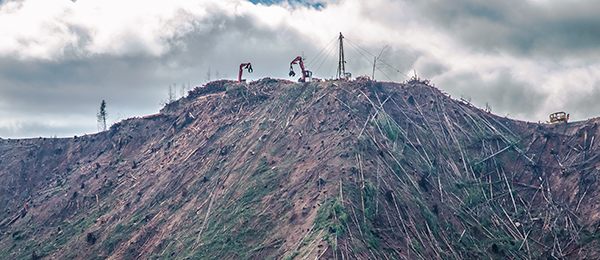“When the last tree is cut down, the last fish eaten and the last stream poisoned,
you will realize that you cannot eat money.”
- Cree prophecy
On June 27th, a logjam of logging trucks circled our state Capitol, spreading lies and fear and spewing diesel soot. Big Timber wants you to believe that taking action on climate will deprive Oregonians of forestry jobs. Rather than investing in a future that would place even greater value on our forests, opponents to the Climate Action Policy (HB 2020) are shackled to the illusory past “glory” of unrestrained logging. It’s the same set of devastating practices that brought us to our current seat on the precipice of disaster.
Let's be clear: no amount of cash for cut logs can compare to the value of clean and abundant water! Beyond Toxics and our allies have spent countless hours speaking out and presenting good science to expose the false choices Big Timber presents via their public relations executives. The very latest scientific research makes clear that Pacific Northwest forests and the soils hold the greatest promise for taking carbon from the atmosphere while also adding new natural resource jobs. Better yet, with selective cutting and longer tree rotations, Oregon could revive the mills that are now shuttered because corporate timber companies make more money by sending big whole logs overseas. Yes, that’s right – big trees are exported to markets overseas while smaller trees are cut, chipped or made into paper and press board here.

Clear cut logging operation at Oxbow Creek in Oregon. Photo by David Tvedt.
We can change the extractive and destructive timber corporate investment model with the emerging revolution in forestry management of what we're calling "resilient forestry."

A tour of Shady Creek Forest, an example of a forest managed with resilient forestry practices in Lane County. Photo by Lisa Arkin.
By embracing the principles and practices of resilient natural resource management, Oregon can improve both our forests’ capability to resist the challenges of climate change and serve the economic interests of everyday people. We already know that forests are pivotal to solving the climate crisis--now we need to act on that fact! The United States Forest Service (USFS) ranks Pacific Northwest forests (Oregon and Washington) as the most productive for carbon storage (citation). It’s not only our living trees, it’s also the organic carbon stored in our forest soils and inter-connected root structures.
We need to manage forests to remove carbon dioxide from the atmosphere and assign economic benefits to resilient forestry practices. Managing forests for more than the narrow, short-term benefit of tree harvesting, Oregon further gains by protecting air and water quality and ensuring a plentiful water supply for our future needs.

Photo by Kali Lamont.
What’s more, resilient carbon-based forestry allows foresters to stop using aerial herbicide sprays and synthetic fertilizers, destructive practices that broadcast poisons made from fossil fuels into Oregon’s streams and waterways –the same streams that provide Oregonians with 70% of their drinking water.
We need a state climate action plan that has a robust forest carbon storage and ecosystem stewardship component. Nothing could be more dangerous to our economy than over-cutting our private and public forests. We face a dire tipping point where the ability of Oregon’s forests to store carbon is diminished, drinking water is contaminated with bio-persistent pesticides and soils are depleted of the micro-organisms that hold ecosystems intact. Join with us to demand climate and forestry policies that save the exquisitely balanced water and carbon cycles within healthy forest ecosystems.
To learn more about the hope of resilient forestry, check out the videos listed below and be sure to sign up for our next Resilient Forestry Tour in Western Lane County on July 20th! (Registration required)
VIDEOS on the subject by Beyond Toxics
Resilient Forestry: Shady Creek
Resilient Forestry: Willow Witt Ranch
also:
Aerial Spraying in Oregon Forests





